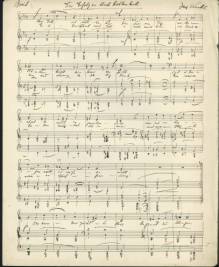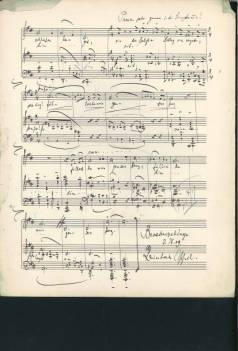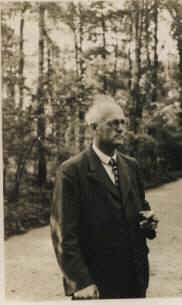About the Arrival of the Reinhard Oppel Memorial Collection at UNT
The North Texas Daily, November 25, 1998, Thomas Dodson: Rare music collection ranks with Harvard. The addition of rare musical theory books, documents, and articles coming in December puts the music library in the same company as Harvard, says Timothy Jackson of the music faculty. Since 1995, Jackson has worked with the Rev. Kurt Oppel on the restoration and new applications of documents by music theorist Heinrich Schenker. Schenker was the Einstein of music theory, Jackson said. His theories in music are the equivalent to quantum physics in science. During the 1930s and 40s Oppel s father, Reinhard, was a professor at the Leipzig Conservatory in Germany. He and Schenker, who was working in Vienna, Austria, corresponded with each other, sending everything from critiques, theories and analysis. Topics included works such as Baroque music, Brahms s Octaves and Fifths, Handel and Bach. Oppel s father died in 1941, but his family buried his documents in Halle, Germany, the same town where Handel worked, before escaping Russian troops. It was not until 1990 that Kurt Oppel retrieved his father s trunk containing the Oppel-Schenker correspondence on musical treatises and humanistic works from the 16th to 19th centuries. What these documents contain is a new application of Schenker s theory to particular analytical musical problems, Jackson said .Jackson also said that NT is trying to put together the Reinhard Oppel Memorial Collection. He said this presentation will bring the college one step closer to that goal.
The Fort Worth Star-Telegram, December 2, 1998, Terry Lee Goodrich: A Classical Discovery. Rare musical documents chronicling the friendship between two noted musicians and theorists are the topic of a presentation today at UNT. Rare musical documents, discovered partly because of the amateur sleuthing of a UNT music professor, chronicle a friendship between two noted classical musicians and music theorists, the late Heinrich Schenker and the late Reinhard Oppel. Today, Oppel s son the Rev. Kurt Oppel of Hammelbach, Germany, who found the letters and composition critiques in a buried trunk in Germany will present a few of them to the university on loan. Schenker, a pianist, composer, and music instructor who edited some Beethoven s work, is the Einstein of music theory, said Tim Jackson, a UNT music theory professor. He developed a whole new approach, looking at how all the parts fit into the whole. Jackson will lecture about the documents some of which are singed by World War II bombings at 2 p.m. today in the university Recital Hall. The lecture will be followed by a performance of Reinhard Oppel s music by UNT faculty members. Jackson s fascination with the friendship between Schenker and Reinhard Oppel, apianist, violinist, and organist, began in 1990. Jackson was in Riverside, Calif., researching a collection of musical documents that endured the Holocaust, including Oppel's letters to Schenker. Oppel would send [musical] manuscripts and even memorablilia to Schenker, who was an Austrian citizen, Jackson said. They d meet for a week every summer, when they d wander around in the Austrian Alps wearing lederhosen, drinking lots of beer and talking about music. Between visits, they wrote to each other about works by Handel, Bach, and Brahms, Jackson said. Oppel was always very polite in his letters Many thanks for your wonderful suggestions. I am always in reverence of your fundamental wisdom and insight into all music. Jackson said he was curious about the other half of the picture Schenker s letters to Oppel, which had not been found. So he was excited a few years ago when a friend told him of an article in a small German music publication about a collection of Oppel s books and letters found near Halle, Germany. After the Berlin Wall came down, Kurt Oppel had traveled there in search of his father s trunk, which his family had hidden for safekeeping in a shed. Jackson tracked down the younger Oppel, explaining his search for the documents. It was only about a year ago that Oppel realized there were all these Schenker documents in the box. It took the two of us awhile, after he photocopied them and sent them, to put the pieces of the puzzle together with the Oppel things from Riverside. They learned that Schenker had admired Rienhard Oppel's expertise, and that Oppel had critiqued Schenker's critiques, though he didn t send them back, Jackson said with a laugh. The younger Oppel said that hearing from Jackson was a real revelation. We didn t know about the letters in Riverside. Here you have a father who is a composer and teacher, but he didn t speak so much about his past. The papers are especially exciting because they are from a later period in Schenker s life than those in other collections, said Les Brothers, chairman of the UNT division of music history, theory, and ethnomusicology. The papers will be kept with rare materials in the university Music Library, protected from fire and moisture but available to students for study.

Reinhard Oppel, Wedding Song, December, 1904, Dedicated to the Composer s First Wife, Reinhard Oppel Memorial Collection, Willis Music Library, University of North Texas
The Dallas Morning News, January 22, 2000, Melinda Rice: Treasure trove of German composer s papers ends up at UNT. Trunk with precious papers lay in garden shed nearly 50 years. They re just papers stashed in plain brown boxes. But they are unlike anything ever seen in this area. The documents more than 10, 000 of them, now in the care of the University of North Texas survived the death of their original owner, the Nazi rampage against all things Jewish, decades hidden behind the Iron Curtain and, finally, a trip of thousands of miles from Germany to Denton. They offer insights into two vastly different topics: music theory and the Holocaust. It s an amazing body of material, says Timothy Jackson, an assistant professor of music at the University of North Texas. He discovered the collection and persuaded its owner to donate it last year to UNT. These papers originally belonged to Reinhard Oppel, a composer and music historian who taught at the renowned Leipzig Conservatory in Germany. He began a friendship with Heinrich Schenker in 1913, and their correspondence, including many critiques and analyses by Mr. Schenker, comprises the bulk of the Oppel Collection at UNT s music library. Mr. Schenker, a famed music theorist, is the Albert Einstein of his field. He came up with a whole new view of how music works, Dr. Jackson says. Finding musical critiques in Mr. Schenker s handwriting is comparable to finding early scribblings by Albert Einstein on the theory of relativity. That alone would make the collection valuable to academicians. Dr. Jackson says the papers shed light on how Mr. Schenker developed his theories, in which he speculated on the motivation behind the music and the composers. But there is another dimension to the papers, one that transcends pure academic interest. Mr. Schenker was Jewish. Mr. Oppel was not, but he was outspoken in his opposition to many Nazi policies. His views and his friendship with Mr. Schenker put Mr. Oppel and his family in disfavor with Hitler s henchmen. After Mr. Oppel died of natural causes in 1941, his family feared his work would be destroyed as part of the Nazis attempt to purge all Jewish influences from German life. So they packed up all the papers in a trunk (ironically, the trunk Mr. Oppel used as an officer in the German army during World War I) and sent the papers to friends in Leune, which would become part of East Germany. The trunk remained hidden in a garden shed until 1990, when Mr. Oppel s youngest son, Kurt, finally retrieved the papers, along with a collection of his father s books, which had been hidden in a nearby church steeple. The books are also part of the Oppel Collection at UNT. The lengths they went to to save these papers are incredible, says Dr. Jackson. It definitely shows their priorities as a family. He began to suspect the papers might exist while doing research one summer at the University of California in Riverside, one of only two universities that had significant Schenker collections at that time. Many entries in Mr. Schenker s diary referred to papers he sent to Mr. Oppel. Excited at the prospect of a cache of new Schenker materials, Dr. Jackson tracked down Kurt Oppel in 1995. He didn t know what he had, says Dr. Jackson. Over the next two years, the two men developed a friendship and went through the papers, which overwhelmed the room they occupied in Mr. Oppel s small flat. In 1997, they met for a concert in London, and Mr. Oppel thrilled Dr. Jackson with samples of the papers, which he had packed between his socks and underwear. I was thrilled. I could barely breathe, says Dr. Jackson. He pulled these papers out, and there was Schenker's handwriting. It was amazing. Mr. Oppel, 70, decided he wanted his father s papers preserved for scholars, so last year he donated them to UNT, where his friend, Dr. Jackson, had just accepted a job. The collection created a stir in the music world and elsewhere, as well .Mr. Schenker died of natural causes in 1935, but his wife was captured by the Nazis and sent to a concentration camp in Czechoslovakia. She died there in 1945. A letter she wrote to the Oppel family, begging for help, terrified Mr. Oppel's wife, who told Dr. Jackson that she had feared the Nazis would come after her family "..UNT is in the process of cataloguing all of the material, and Dr. Jackson is evaluating it for a a book he is writing on how Mr. Schenker thought. Can you imagine bringing a collection like this to your university in your first year there?" asks Dr. Lester Brothers, chairman of UNT s division of music history, theory, and ethnomusicology. It was exciting for all of us.
A page from Oppel s 1924 Habilitation on Melodic Structure Preserved in the Reinhard Oppel Memorial Collection, the Willis Music Library at the University of North Texas
Dr. Jackson s research on Kletzki resulted in the world-premiere recording of Kletzki s Third Symphony by the Norrkoeping Symphony, Thomas Sanderling conducting, September 1-5, 2003, for BIS Records. The world-premiere recording of Kletzki s Flute Concertino by Sharon Bezaly, flute (with Norrkoeping and Sanderling) was completed May 5-10, 2003 for BIS Records. Dr. Jackson arranged for the preparation of score and parts for the Third Symphony at UNT and participated in the recording of the symphony. Additionally, he wrote the program notes for the CD booklet. The CD is due to be released in March 2004.
Rediscovered Lieder. Post-war world premieres by Pille Lill (soprano, Professor of Voice, Estonian Academy of Music) and Heejung Kang (UNT pianist) of Josef Knettel s Lieder aus dem VII. Ring (Stefan George) and Kletzki s Sehnsucht, Op. 6, No. 2 (Roelli). Co-sponsored by T.H.E. Division and the Dallas Goethe Center. Dr. Jackson organized the concert and gave a brief introductory lecture.
Two Great Composers: Three Great Works on April 25, 2003. Post-war world premiere performance of Paul Kletzki s Concerto for Piano Op. 22 (1930), first two movements, version for two pianos, by Joseph Banowetz and Heejung Kang. World premiere performance of Kletzki s Concertino for Flute and Orchestra, Op. 34 (1940), arrangement for flute and piano by the composer, James Scott (flute) and Gustavo Romero (piano). Co-sponsored by T.H.E. Division and the Dallas Goethe Center. Dr. Jackson organized the concert and gave a brief introductory lecture.
Organized the establishment of the Josef Knettel Memorial Collection at the Willis Library, the celebration concert, and Dr. Maas s trip from Germany to UNT. The concert on Oct. 4, 2003 celebrated the arrival of the Josef Knettel Memorial Collection at the Willis Music Library in the summer of 2003, with additional material continuing to arrive throughout 2003. A guest recital by baritone Erik Nelson Werner accompanied by UNT pianist Heejung Kang. Josef Knettel, a close friend and colleague of Reinhard Oppel, was a composer and well-known choral conductor based in Bingen, Germany. As part of the event, Dr. Dieter Maas, Knettel s grandson, who has collected all of Knettel s available manuscripts, books, and scores, and generously donated them to the Willis Music Library, spoke about his grandfather s life and work.

Left to right: Dieter Maas (Josef Knettel s grandson, donor of the Josef Knettel Memorial Collection), Erik Nelson Werner (baritone), James Scott (Dean College of Music), Heejung Kang (pianist), Timothy Jackson (October 4, 2003).

Manuscript of Josef Knettel s Song Der Erfolg von Mark Rahlenbeck in the newly established Josef Knettel Memorial Collection.
Contribution to the Opera Division and to the support of graduate students in the History, Theory, and Ethnomusicology Division. During 2003, Dr. Jackson continued to supervise work on the world premiere of the opera Dorian Gray by Swiss composer Hans Schaeuble. In 2000, with Opera Director Stephen Dubberly, he applied for and won a grant of $64,000 from the Hans Schaeuble Foundation in Zurich to support type-setting a publishable full score performing edition of the opera, a staged production by the UNT Opera Division, and the world premier recording to be distributed by Bridge Records based in the UK. Performance and recording of the opera are scheduled for the week of February 7, 2004.
With Peggy Walt and others, Dr. Jackson co-organized a historic Lost Composers Concert on November 11, 2003 ( Kristallnacht ) at Pier 21 in Halifax, Nova Scotia Canada. The concert featured post-war world-premiere performances of Paul Kletzki s String Quartet in A minor, opus 1 and Reinhard Oppel s String Quartet #2 in D minor and Cello Sonata in B minor (1904), and performances of five Lieder by Oppel in the presence of the composer s son Kurt. The performers included the Blue Engine String Quartet, Sung-ha Shin Bouey (soprano, Assistant Professor of Voice, the University of Prince Edward Island), Petter Allen (pianist), and Shimon Walt (cellist). This performance will be broadcast nationally in Canada by CBC Radio 2 along with my pre-concert lecture. The concert was well-publicized in Canada with pre-concert feature articles appearing on the Canada page of the Saturday edition of the Globe and Mail.
John DeMont is writing an article about my work to be published in Maclean s Magazine, the Canadian equivalent to Time Magazine.

Manuscript Score of Oppel s Setting of Schliesse mir die Augen beide, dated September 7, 1909 (Theodor Storm), in the Reinhard Oppel Memorial Collection, Discussed in my 2003 Article "Schliesse mir die Augen beide: an Analysis of Five Settings by Berg, Oppel, Tintner, and Kletzki."
The Crane Symphony Orchestra under the direction of Dr. Christopher Lanz (Nov. 16, 2003) in Hosmer Hall gave the world premiere of Reinhard Oppel s Adagio for Orchestra (1939) and Andante for Orchestra.
Intensive, on-going efforts to publicize the Oppel Collection in particular, and Hidden Music in general. Armed with the CBC Documentary (2001), the CD of Rediscovered Lieder and Piano Pieces prepared at UNT, and CDs of the concerts listed above, Dr. Jackson has begun to seek publishers and commercial recording companies to disseminate the music of Oppel, Kletzki, Schenker, and other composers directly or indirectly associated with the Schenkerian School of analysis and composition. Martin Anderson of Toccata Records has decided to produce a CD of Oppel s piano music with UNT pianist Heejung Kang, and Robert von Bahr of BIS Records has initiated a series of recordings of Kletzki s orchestral music. The two-piano version was published by Simrock in 1933 but, after the Nazi take-over, the full score was never released (the autograph full score may have been destroyed by the publisher). Under my supervision, John Norine is completing the orchestration so that Prof. Banowetz can record the work in Norrkoeping for BIS in 2005.

Heinrich Schenker's Close Friend and Colleague, Reinhard Oppel in 1938




